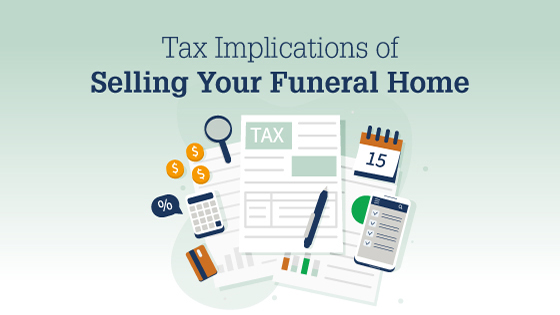When looking to sell your funeral home, taxes should be one of your top considerations. In addition to the expected capital gains taxes, you’ll also have to consider how your real estate and income play into the equation.
Especially if you’ve been in business for many years, you’ll want to pay close attention to both local and federal regulations. To ensure a successful sale of your funeral business––with no surprises from the IRS––you need to be prepared.
Here’s what to consider:
Capital Gains
When you sell your funeral business, you’ll first want to consider the capital gains tax. This tax is levied on the profits made from any type of investment when the investment is sold. Often, this tax applies to the sale of stocks; however, it also applies to businesses and real estate. The rates for this tax are 0%, 15%, or 20%, depending upon the bracket of the taxpayer during the year of sale.
Because funeral homes tend to stay around much longer than other businesses––sometimes over one hundred years––the capital gains can be significant. This potentially puts funeral home and cemetery professionals at a greater tax risk than others, as they’ll likely report significant totals of capital gains.
For example, if you purchase a funeral home for $300,000 and sell it 20 years later for $1 million, then you stand to owe $140,000 in capital gains taxes, depending on your income, losses, and other factors. The key here is to speak to an accountant before the sale so that you can anticipate these taxes. A common regret of funeral home owners is neglecting capital gains and being shocked at the totals they owe to the IRS.
Depreciation Recapture Tax
Unlike other businesses, funeral homes also almost always include real estate, which must also be taken into account during the sale of your business. In particular, you’ll want to consider the depreciation recapture tax
Traditionally, funeral and cemetery businesses account for wear and tear on their facilities and equipment by deducting a percentage of the asset’s value each year. However, upon the sale of your facilities and equipment, the IRS will collect taxes on any profitable sale of these assets that you’d previously used to offset taxable income. The depreciation recapture is taxed at the ordinary income tax rate up to a certain threshold percentage, which could mean well over $500K-$1M in additional taxes.
To begin understanding how this will affect you at the time of sale, consider the cost basis of your assets. The initial cost basis is the amount you paid for the asset. The adjusted cost basis will be the initial one minus any depreciation expenses that occurred. For depreciation recapture tax purposes, you’ll be taxed on any amount of sale greater than the adjusted cost basis. Again, the key is to remain aware of the tax deductions you’ve used over the years.
Income Taxes
Oftentimes, ordinary income taxes have an even greater impact than capital gains taxes. This is because, for most individuals, the capital gains tax rate will be about 15%. However, the income tax rate can be as high as 37% for income over $523,600.
This is why it’s a particularly good idea to explore a potential sale now, as both capital gains and income tax rates are likely to increase in the coming years. In the wake of the pandemic, valuations are also higher for funeral businesses, making now an ideal time to consider putting your funeral business on the market.
Trust Funeral Profession Experts
The process of selling your funeral business has a lot of moving parts. In addition to considering all of the issues of tax compliance, you’ll also have to obtain a solid valuation, find the right buyer, and broker the eventual deal––not to mention the day-to-day operations of your funeral home. Unless you’re an expert in both tax code and business brokerage, you’ll likely want to enlist the help of an expert team.
Johnson Consulting Group is the all-in-one package offering all the expertise you need in one place. Our team of consultants can help you get your funeral business in tip-top shape for a sale. Our brokerage team can perform an evaluation, pitch your business to qualified buyers, and negotiate the terms of transfer. And our team of accountants can help you get your financials in order, both before and after the sale, ensuring that tax season won’t come with any unpleasant surprises.
Relying on a team of industry experts guarantees the sale of your funeral home will be a seamless process.
ENSURE YOUR FUTURE
